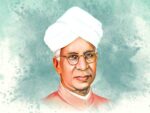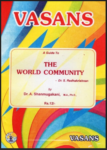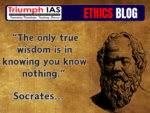On the Occasion of Teachers Day
[Relevant for Public Ethics, Integrity and Aptitude]

On the Occasion of Teachers Day
Sarvapalli Radhakrishnan & His Views on World Community
One of India’s most recognised and influential thinkers of the 20th century, Radhakrishnan’s life and work was dedicated to defining, defending, and disseminating the Hindu religion. He is seen in philosophy circles as a bridge-builder between India and the West, and credited for his role in shaping the West’s understanding of Hinduism.
Radhakrishnan was among the foremost proponents of the non-dualist Advaita Vedanta tradition in the 20th century, and re-interpreted Adi Shankara’s philosophy for modern times. In doing so, he defended Hinduism against what he said was “uninformed Western criticism”.
Being a thinker of repute he was also a brilliant teacher. He adorned the VC post for Andhra Univ and later BHU; he also got knighted by the British Royalty. He became the first Vice President (1952-62), and the second President of India (1962-67). In 1962, after he became president, some old students expressed their wish to celebrate his birthday. Radhakrishnan refused a personal celebration, and instead requested his students to honour teachers across the country on his birth anniversary.
Thus began the tradition of celebrating Teachers’ Day on September 5.
On October 20 1936, Sarvepalli Radhakrishnan delivered the inaugural lecture as the newly elected Spalding Professor of Eastern Religion and Ethics at the University of Oxford. The lecture entitled “The World’s Unborn Soul” seems as much a tract for our times as it did for his.
In this he delved on the deeper issues about the “mystical yet nefarious” charm of nationalism; how nationalism feeling is bestial and does not fit with the “partly” evolved (in Hegelian sense) human soul thus causing all the ills of the day and even today when we see Hamas-Israel, Ukraine-Russia and many more. He further talked about the differentiating factor between “ego” and the “self”. How does one unites when he identifies with the “self” and cuts himself into islands of self-centeredness and chaos when his identification goes with the “ego”.
In this blog, today i.e. Teachers Day (5th Sept 24) I would be taking some of the quotations he used in that lecture to decipher what he stood for and how his insights were so ahead of his time.
The world Radhakrishnan describes in that lecture is a world of feverish energy, chaotic activity, and immense creativity. But it is also confronting an abyss: Morally confused, wracked with uncertainty, and no sense of where all the political chips were going to fall.
The biggest disquiet stems from the fact that, as an empirical matter, the world is a single community of fate.
In his book “The world community” he writes “For the first time in the history of our planet its inhabitants have become one whole, each and every part of which is affected by the fortunes of every other. Science and technology, without aiming at this result, have achieved the unity. Economic and political phenomena are increasingly imposing on us the obligation to treat the world as a unit. Currencies are linked, commerce is international, political fortunes are interdependent.”

Yet the forms of political organisation we inhabit, the consciousness we embody in our daily lives, the identities we give allegiance to, are still structured in ways that make us oblivious to this obvious fact.
As he writes, “the sense that mankind must become a community is still a casual whim, a vague aspiration, not generally accepted as a conscious ideal or an urgent practical necessity moving us to feel the dignity of a common citizenship and the call of a common duty. Attempts to bring about human unity through mechanical means, through political adjustments, have proved abortive.” The misalignment between what determines our fate and how we think of our identities was a recipe for disaster.
The second theme running through the lecture was the exhaustion of existing ideologies and outlooks on life. As said above, the whole underpinning line of his lecture is Hegelian in its sensibility: Human beings will strive for meaning. Each civilisation represents an achievement of sorts in this journey.
In the context of the West, Greeks were the font of a creative worldly empiricism; Romans a font for secular law. Christianity brought an incandescent sense of transcendence and inner depth, but also bigotry and religious fanaticism; the Renaissance restored a sense of free creativity. The spirit of free inquiry unleashed by the Enlightenment paves the way for democracy; the modern aspiration for the dignity of the individual also transforms into movements for economic justice.
This history is eloquently told, even though it is a selective history, necessitated by the confines of a lecture. These sensibilities also run parallel to various projects of domination. All of these movements have made the modern world, and all of these gains have to be maintained.
But while old faiths have dissolved, what is put in their place is far more precarious, and in some cases more dangerous. Our sense of self is more fragile.

We increasingly turn to therapy for self-maintenance. As he writes, “The long-starved powers of the soul reassert their claims and shift the foundations of our mind. The weak, the wounded, and the overstrained souls turn to psychoanalysis which deals with the problems of the soul, under the guise of rationality and with the prestige of science.” But the political manifestations of the crisis are more dangerous. The first, more of a mixed bag, is the growing power of the state.
We look to the state for justice.
But, ultimately, the state is a power that devours everything. As he writes, and this according to me is most profound, proficient and precinct – “The state which is the most powerful organisation is least hampered by inner scruples or outer checks. Man in the community is at least half civilised, but the state is still primitive, essentially a huge beast of prey. We have no strong public opinion, or effective international law to restrain the predatory state.”
The most dangerous pathology is nationalism. Identification with nations is old, but in the modern world it colonises all spaces, becomes the ultimate source of meaning.
He writes, “Nations have become mysterious symbols to whose protection we rally as savages to fetishes.”
So, the paradox of the modern age: The rational emancipated individual unable to understand the deep irrational sources of his own disquiet, the age of individual liberation underwriting the power of a predatory state, the age that dispensed with religion fills it with an even more narcissistic, domineering and racialised religion: Nationalism.
So where do we turn?
There are two hints of a direction.
The first is openness. He writes, “The great periods of human history are marked by a widespread access of spiritual vitality derived from the fusion of national cultures with foreign influences. If we take Judaism, we find that Abraham came from Mesopotamia and Joseph and Moses from Egypt. Later, Judaism shows the influence of Hellenism. Asia Minor and Egypt exercised considerable influence over the Greek development. The creative genius of the medieval world came from Palestine.”
And in a swipe against Euro-centrism he writes, “Now that we have the whole world for our cultural base, the process of recovery and training in classics cannot cease with listening to the voices of Isaiah and Paul, Socrates and Cicero. That would be an academic error, a failure of perspective. There are others also who have participated in the supreme adventure of the ages, the prophets of Egypt, the sages of China, and the seers of India, who are guide-posts disclosing to us the course of the trail.” The whole world is our cultural base.
The second hint is this. The core problem is that we confuse the Self with the Ego, and it is the Ego that derails all ideals. The only meaning of “spirituality” is the extinguishing of the Ego. But the route to this is an engagement with the Self, not another ideology. As he writes, “The soul that has found itself is no longer conscious of itself in its isolation. Those who are anxious to live in peace with their own species and all life will not find it possible to gloat over the massacres of large numbers of men simply because they do not belong to their race or country. Our normal attitudes to other races and nations are no more than artificial masks, habits of thought and feeling, sedulously cultivated by long practice in dissimulation.”
As we honour Radhakrishnan on Teachers’ Day, we might as well read him, not in the spirit of a nationalistic paean to this or that tradition, but to an open world trying to discover its yet unborn soul. And certainly world would not like to have its unborn-soul amidst the devilish nationalistic fervor we see wherever we raise our eyes be that in Middle East or the Black Sea or within the minds of the world leaders. I think they have, too, like all of humanity have confused their mind – the ego – with the “Self” – the aatman.
#EthicsBlogoTerms
Related Blogs …
 |
 |
Follow us :



Find More Blogs…
| Compare and contrast Karl Marx’s and Max weber’s | Karl Marx- Historical Materialism |
| Position of Women In the Modern Indian Society | Sociology: Social system and pattern variables |


